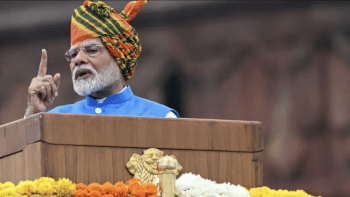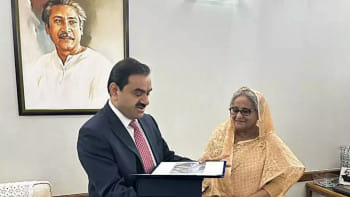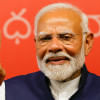Why is the BJP playing the 'Bangladeshi infiltrator' card?

Led by Prime Minister Narendra Modi, India's ruling Bharatiya Janata Party has placed "infiltration" of Rohingyas and Bangladeshis at the core of its high-decibel campaign for assembly elections in the eastern state of Jharkhand due later this year. At a series of public meetings in a space of one week or so, Modi and his close aide Amit Shah, home minister, amplified the infiltration issue in their separate ways. But some comments made by Shah at one of the rallies drew a sharp retort from the Bangladesh foreign ministry.
Shah may not have been entirely unaware that his remarks in Jharkhand could raise the hackles in Bangladesh like his "termite" description of allegedly illegal immigrants from Bangladesh in the run up to West Bengal assembly elections had done more than three years ago.
It was Prime Minister Narendra Modi who first raised the issue of infiltration at a rally in Jamshedpur, Jharkhand, when he blamed the state's ruling coalition of Jharkhand Mukti Morcha (JMM), Congress and Rashtriya Janata Dal (RJD) for change of demography in Santhal Parganas and Kolhan by allegedly facilitating infiltration of Rohingya and Bangladeshis. He said Bangladeshi and Rohingya infiltration poses a major threat to Jharkhand as it is "rapidly changing" the identity and demography of the Santhal Pargana and Kolhan regions. Thereafter Amit Shah, BJP President J P Nadda and senior leader Shivraj Singh Chouhan, in their separate rallies, also flagged the issue.
Nadda in his speech accused the JMM-led alliance of patronising the forces indulging in "love jihad," "land jihad" and "infiltration jihad." Shah too, at a rally at Giridih, said, "If infiltration is not checked, illegal immigrants will become the majority in Jharkhand in the coming 25-30 years. They are marrying our daughters, grabbing land and destroying rich tribal culture."
Hitting back, the JMM and the Congress have maintained that the BJP needs to answer how infiltration was taking place, if at all, since protecting the international borders is the central government's responsibility (BSF which guards the border with Bangladesh). They have also accused the BJP of "playing Hindu-Muslim politics by stoking tensions before the elections."
BJP leader Asha Lakra, a member of National Commission for Scheduled Tribes, had led a team of the Commission to Jharkhand to probe reports of infiltration in the state. She told The Hindu that their probe "confirmed that infiltration is taking place" and has documented purported "evidence" of this in its 28-page report which is largely based on anecdotal material gathered from conversations with "neighbours, panchayat members, and villagers." The report, she said, has been submitted to the Home Ministry.
Why has BJP made infiltration as the main election campaign plank in Santhal Parganas and North Chotanagpur and Kolhan region in the southern part of the state? The party's leaders claim the issue finds resonance among the tribals in the state's Santhal Pargana district which accounts for 18 of the 28 Scheduled Tribes (ST)-reserved seats in the assembly whose total strength is 82 including a nominated member. The party, which now has just four MLAs in Santhal Parganas, is aiming to increase the number against Jharkhand's ruling alliance led by regional outfit Jharkhand Mukti Morcha led by Hemant Soren who has inherited the political legacy of his father Shibu Soren. The BJP hopes its espousal of the cause of tribals in Jharkhand would find resonance beyond the state's borders. It is relevant to point out that infiltration has been a major poll plank of BJP in West Bengal and Assam which have for decades witnessed the influx of undocumented people from Bangladesh.
The BJP has sought to make a political capital out of an order of the Jharkhand High Court about the institution of an independent fact-finding committee to probe the "infiltration of Bangladeshi immigrants" in Santhal Parganas. This, according to the court, is necessary because of the "conflicting" stands taken by the Centre and the state on the subject. The court has been hearing a Public Interest Litigation since 2022 which alleged Bangladeshi infiltration in Santhal Pargana area. "The State is disputing the infiltration issue, while the data, which has been furnished, as has been taken note in the order (August 8) with respect to decrease of the tribal population from 44.67% in the year 1951 to 28.11% in the year 2011 reflects otherwise," noted the court order. "However, linkages to Bangladeshi immigrants in any of these land related cases have not been established so far," reads an affidavit submitted by the Union Ministry of Home Affairs. Amit Shah has welcomed the Jharkhand High Court's directive to form a committee to investigate the infiltration from Bangladesh and said the Centre would soon form a committee with the help of the Jharkhand government to probe it.
The Indian government's anti-money laundering agency Enforcement Directorate has initiated an investigation under the stringent Prevention of Money Laundering Act (PMLA) against illegal infiltration of Bangladeshis and Rohingya in Jharkhand, a section of the Indian media reported. The ED's enforcement case information report under PMLA is based on a FIR of Ranchi police registered at Bariyatu on June 6 but the ED will look into the larger issues including the money generated from infiltration being channelised into politics. The case is a first under PMLA as the ED is investigating the involvement of suspected human trafficking agents.
Jharkhand police's FIR relates to the trafficking of six girls—Rohingyas and Bangladeshis—who were apprehended during a raid. Subsequent investigation showed they had obtained identity papers and Aadhaar cards in Hindu names based on fake documents arranged by human trafficking agents from Kolkata. The ED has already gathered details from other central agencies related to the operation of a syndicate engaged in trafficking Bangladeshis and Rohingya through forests in Jharkhand. A network operating out of Kolkata is engaged in forging documents to help the alleged infiltrators pass themselves off as Indians from Bengal, sources said.
Pallab Bhattacharya is a special correspondent for The Daily Star. He writes from New Delhi, India.
Views expressed in this article are the author's own.
Follow The Daily Star Opinion on Facebook for the latest opinions, commentaries and analyses by experts and professionals. To contribute your article or letter to The Daily Star Opinion, see our guidelines for submission.

 For all latest news, follow The Daily Star's Google News channel.
For all latest news, follow The Daily Star's Google News channel. 











Comments